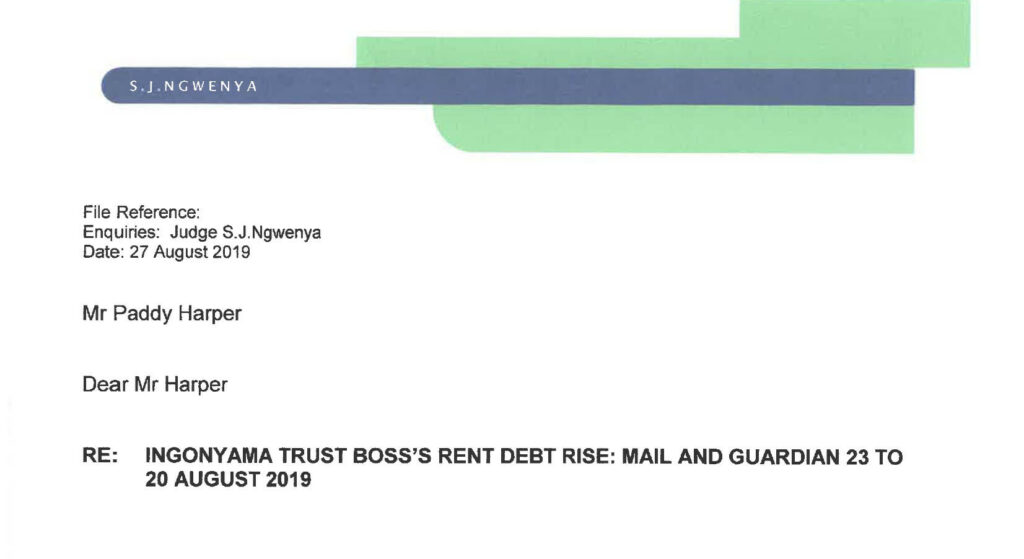Judged and found wanting: Documents reflect that Jerome Ngwenya, the chairperson of the Ingonyama Trust Board, continued to use the title of judge despite having resigned
Jerome Ngwenya, the chairperson of the Ingonyama Trust Board (ITB), has not responded to Chief Justice Mogoeng Mogoeng’s censure for using the title of judge, despite not being entitled to do so.
He has been reported as telling the Weekend Witness that he would not comply because he had not been contacted directly by Mogoeng.
Last month, Mogoeng informed Ngwenya, who had been appointed to the Western Cape division of the high court in 2000, but who subsequently resigned, that unlike a sitting or retired judge, he had no right to use the honorific.
Ngwenya is the nominee of King Goodwill Zwelithini kaBhekuzulu on the ITB, which controls nearly three million hectares of land in KwaZulu-Natal on behalf of the monarch. Ngwenya was appointed to the post in 2005, having previously acted as vice-chairperson.
On Tuesday, Nathi Mncube, spokesperson for Mogoeng, confirmed that his office had written to Ngwenya requesting that he confirm in writing that he would “actively distance himself from the use of the title judge or justice”.
Mncube said the letter was intended to “ensure a common understanding of the use of the title” before a statement is issued.
He said that Ngwenya, who had failed in a subsequent attempt to be appointed as a judge, cannot project himself in documents or be regarded as a judge or honourable justice.

“Despite this obvious reality, and as borne out by various documents and based on numerous accounts, Mr Ngwenya holds himself as, and has allowed people to regard, address and treat him as a judge or justice,” Mncube said. “It is important for the public to know that unlike serving and retired judges, the JSC [Judicial Service Commission] cannot take steps against a person who has resigned as a judge when such a person is alleged to have done or said something believed to be unethical.”
It is not clear precisely what action or statement by Ngwenya rang alarm bells with the chief justice.
The ITB has come under fire in Parliament over its corporate governance and has received qualified audits from the auditor general in recent years. Earlier this year it failed to meet the deadlines for the submission of its annual financial statements, due in part to a dispute between Ngwenya and the ITB’s entire executive management team, whom he had placed on suspension
Last month, Ngwenya’s former business partner, Vuyo Ndzeku, appeared before the Zondo inquiry into state capture over an alleged R2.5-million bribe paid to former SAA technical head Nontsasa Memela.
Ndzeku and Ngwenya were partners in Khuselani Security and Risk Management and Zwelibanzi Utilities. Khuselani had formed a consortium with Swissport for a ramp handling contract with the Airports Company of South Africa in late 1992. Khuselani was subsequently stripped of a R99-million contract and investigated for tax violations, over which Ngwenya’s brother, Noel, who was the company’s chief executive, was jailed.
Mncube said Mogoeng intervened because “the risk that flows from leaving anybody to impersonate a judge is that he or she could harm the judiciary without adverse consequences”.
Last week, the land reform, rural development and agriculture minister, Thoko Didiza, reappointed Ngwenya as chair of the ITB’s interim board until a permanent board is appointed for the entity.
Mncube said Ngwenya had not responded to the chief justice’s letter by Tuesday. He would not be drawn on what action would be taken should Ngwenya not comply.
Ngwenya did not respond to emails from the Mail & Guardian. He cut phone calls and appears to have then blocked the numbers.
In the letter to Ngwenya, Mogoeng’s head of private office, Sello Chiloane, said Ngwenya had presented himself as a judge in documents including the ITB’s annual reports.
“For years now, you have held yourself out or allowed people to regard, address and treat you as a judge or justice, as … is borne out from various documents including the Ingonyama Trust Board’s annual reports. But, as you know, you are not,” Chiloane wrote.
He said that other judges who had resigned, such as Mervyn King and Ismail Hoosain, “never seek to be addressed as such because they, like you, resigned and accepted that they could not be regarded as judges”.
Chiloane said the time had come for the matter to be clarified and that Mogoeng required written confirmation that Ngwenya would actively distance himself from the use of the title and “correct those who address you as such”.